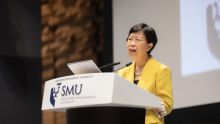A blueprint for transformative education strategies

SMU has set digital transformation, sustainable living, and growth in Asia as the three priority areas for the university’s next phase of growth.
These priorities will guide the development of SMU’s strategies for realising SMU Vision 2025. Among these strategies are: a continued focus on transformative education and cutting-edge research.
In both of these areas, SMU’s longstanding emphasis on the value of interdisciplinarity will be a key differentiator, says the University’s Provost Professor Timothy Clark. Already, all SMU students take courses from outside their School and are able to participate in multi-faceted industry projects in which they need to apply knowledge from various disciplines. SMU’s Core Curriculum was also refreshed in 2019 to expose students to a wide range of disciplinary approaches.
As such, the majority of SMU students graduate with a second major, a second degree, or both, and are able to apply their knowledge and skills across various contexts with greater mental flexibility.
“No discipline is an island,” Prof Clark believes. “Our cross-disciplinary strategies in education and research will engage and address the three strategic priorities of Vision 2025. This will help drive direct societal impact and build a world-class reputation.”
To further enhance SMU’s cross-disciplinary and interdisciplinary pedagogy within its undergraduate, postgraduate and professional and continuing education, the University will refresh its current programmes and develop new course offerings to align with the priorities of the strategic plan.
It will also develop and enhance collaborations with strategic university, industry and public sector partners to deliver innovative educational experiences, such as virtual exchange programmes and programmes that interlace campus studies with industry work.
The role of technology
Technology will also be deployed to enhance personalised, collaborative, interactive, experiential, and lifelong learning, says Prof Clark.
In this area as well, SMU’s efforts started years earlier. The University published its Technology-Enhanced Learning framework in 2018. But COVID-19 has brought new challenges and potential opportunities, which will have long-term benefits for a SMU educational experience.
“The pandemic has forced us to pivot very quickly from a physical in-class environment to online learning. This has allowed us to evaluate new instructional technologies, incorporate and hone new teaching and learning skills, while continuing to deliver the SMU interactive learning pedagogy,” says Prof Clark.
Going forward, resources and energies will be focused on key areas, such as harnessing Artificial Intelligence (AI). For example, AI may be used to provide students with personalised knowledge feeds that cater to their prior learning, areas of interest and online behavioural patterns. Learning analytics could provide students with personalised feedback and strategies on their courses and projects, while AI-based applications could also support instructors in designing standardised assignments and code assessment matrices.
Another area of focus is virtual instruction. SMU’s current experiments in blended learning (comprising curated digital sessions and interactive classroom sessions) in some postgraduate programmes have been well-received, and “we will seek to extend this success to a larger scale, including for our undergraduate courses”, says Prof Clark.
Virtualisation could also be extended to the SMU-X experiential learning pedagogy, with virtual projects or interactions with overseas partner organisations facilitated by project management and visual collaboration tools.
Also on the horizon: developing Massive Open Online Courses (MOOCs) for alumni, students at SMU and elsewhere and those thinking of studying at SMU; and establishing a secure data lake that houses information such as students’ course choices, grades, and decisions on global exposure. “This will allow SMU to make data-informed decisions on curriculum design, student development, and instructional effectiveness, and help drive educational innovation,” he explains.
Roadmap for success
In addition to adopting technological innovations, many business schools have been exploring new forms of external partnerships with enterprises, their advisory boards, alumni and other stakeholders during the pandemic.
Indeed, industry partnerships will be one of the key enablers of SMU Vision 2025. The other three enablers are innovation, internationalisation, and integration. “The enablers are really important,” says SMU Senior Vice President Hugh Edmiston. “They will help build the pathways between SMU’s Schools and the public and private sectors, and identify shared strategic themes, issues, challenges and opportunities that can be explored and tested on our City Campus.”
To create such pathways, SMU plans to develop a framework proposal and a three-year costed road map for industry, innovation and internationalisation, which will be presented to staff and faculty for their feedback, he says. “A series of working groups will then be tasked to create teams to execute these road maps.”
With regard to integration, an overarching framework will also be developed to connect and share information across the University, and present a “shop window” of services and programmes designed to support the adoption of new technologies across key industry, public and non-profit sectors, he adds.
As SMU embarks on this phase of SMU Vision 2025, it is important to keep the big picture in mind, says Mr Edmiston. The young generation has a strong desire to tackle urgent global challenges and create positive impact. As such, the University wants to make innovation entrepreneurship a focal point for SMU students, and also provide them with a solid grounding in the ethical and social considerations of innovation.
In the realm of technology, for instance, “we will need to address citizen perceptions of the risks associated with the adoption of new technology, and ensure that these are fully identified and inclusively addressed”, he notes.
“It is an interesting and a critical time for everyone,” says Mr Edmiston. “SMU has engendered and stimulated many of these socially conscious traits over the last 20 years, by providing students with an interactive learning experience, opportunities to work on community projects, as well as international business experience. These values will continue to provide the building blocks from which we can develop new opportunities.”
Adds Prof Clark: “Through the usage of innovative, award-winning teaching techniques and tools, the University fosters innovative learning experiences to engage and inspire students to think critically, creatively and holistically. We aim to create influential positive change agents who drive change that positively impacts business, government and society.”


